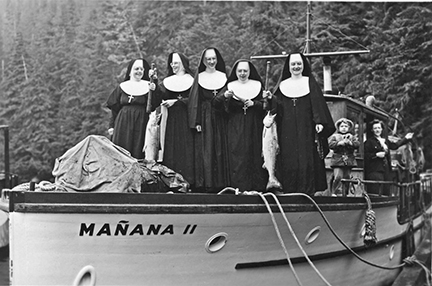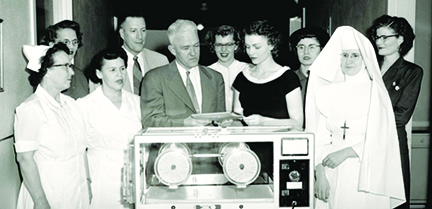Feb. 22 was the 100th anniversary of the official start of the Sisters of St. Joseph of Peace health care ministry in Ketchikan, Alaska. On that date in 1923, Bishop Joseph Crimont, the vicar apostolic for Alaska, dedicated
the Little Flower Hospital to the island community, and that hospital served as the foundation for the sisters' ministry that since has expanded significantly in Ketchikan.
 Sisters of St. Joseph of Peace show off their catch in Loring, Alaska, in the late 1950s.
Sisters of St. Joseph of Peace show off their catch in Loring, Alaska, in the late 1950s.PeaceHealth will be commemorating the centennial with a historical display at PeaceHealth Ketchikan Medical Center this spring, an April event at a local museum, and a community barbecue in August. The health system produced a documentary on its 100 years of serving the Revillagigedo Island community. The borough has a population of nearly 14,000.
Three Sisters of St. Joseph of Peace were dispatched to Ketchikan to staff Little Flower Hospital. The sisters sold $10 tickets to loggers that entitled the purchaser to health care services for a year.
By the 1960s, Little Flower Hospital had become outmoded. Sr. Andrea Nenzel, CSJP, a director of the PeaceHealth board and the congregational leader of the Sisters of St. Joseph of Peace, explains in the documentary that the sisters and the city of Ketchikan
entered into an agreement that had the city building and owning a new hospital and the sisters running it.
Tim Walker, supply chain manager at PeaceHealth Ketchikan, says in the video that the city "understood the value of having the sisters here, so they created a unique facility among all the PeaceHealth facilities — where we're owned by and belong
to the community."
In the 1970s, the hospitals that the Sisters of St. Joseph of Peace had founded across the western U.S. — the Ketchikan hospital included — incorporated under a system structure. In 1994 that organization was named PeaceHealth.
 In 1953, members of the Ketchikan chapter of the Beta Sigma Phi social organization present a new incubator to representatives of the city and the hospital.
In 1953, members of the Ketchikan chapter of the Beta Sigma Phi social organization present a new incubator to representatives of the city and the hospital.Since 2011 the Ketchikan facility has been called PeaceHealth Ketchikan Medical Center. Today the hospital is a 25-bed critical access facility with 29 long-term care beds. The hospital has an average daily inpatient census of 10 patients. The hospital
employs 468 people and has a medical staff of 54. Among the services the facility offers are emergency medicine, general surgery, orthopedic surgery, obstetrics, laboratory services and home health care.
Multiple commentators in the documentary note that PeaceHealth Ketchikan is much better staffed and equipped than most hospitals that are in small, remote communities. They attribute this to several factors. For one, given the island's long history
of dangerous industries — including mining, timber harvesting and commercial fishing — the hospital has had to build up strong trauma capabilities.
Since the island is only accessible by air, the sisters and the community continually have pushed for the hospital to get advanced technology not commonly available in small community hospitals on the mainland — often the upgrades were funded
by community philanthropy.
Lanetta Lundberg, PeaceHealth Ketchikan foundation board chair, says in the documentary that the sisters' strength, determination, tenacity and commitment to Ketchikan propelled the medical center and helped make it the impactful facility it has been
for a century.